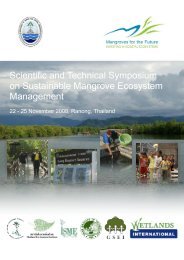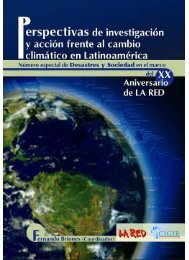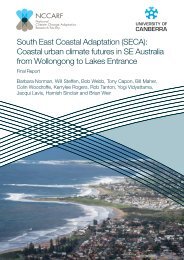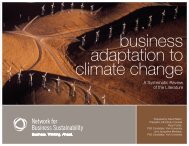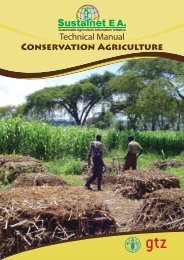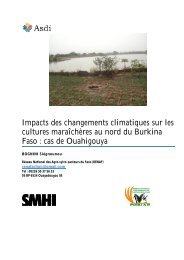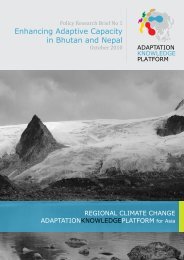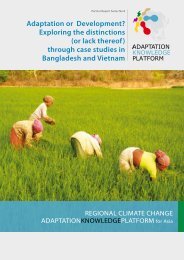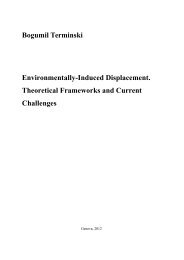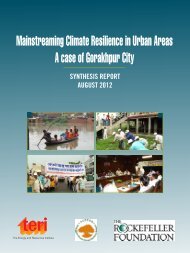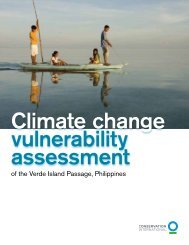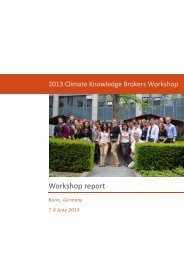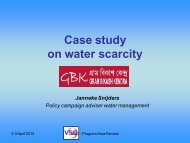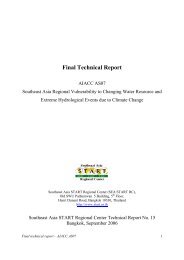Urban food security, urban resilience and climate change - weADAPT
Urban food security, urban resilience and climate change - weADAPT
Urban food security, urban resilience and climate change - weADAPT
You also want an ePaper? Increase the reach of your titles
YUMPU automatically turns print PDFs into web optimized ePapers that Google loves.
the Gold Coast remains a city that contains significant agricultural activity across itsjurisdiction <strong>and</strong> where over half of all its l<strong>and</strong> remains undeveloped.These two cases were selected to reflect these different historical trajectories as wellas a different set of local political institutions, as part of our inquiry was to explore theinstitutional <strong>and</strong> regulatory environment in which <strong>urban</strong> agriculture is either helped orhindered <strong>and</strong> in which various <strong>climate</strong> adaptation policies help to frame theseresponses.In each case study area interviews were conducted with a range of key informants,identified using snowballing techniques. These have been supplemented withdocuments produced by some of the relevant organisations. While the original intentionwas to interview approximately 15 key informants in each city, in practice thedistribution was more skewed. Due to the comparatively higher level of activity inMelbourne <strong>and</strong> a shared interest in advancing the practice of <strong>urban</strong> agriculture it waspossible (<strong>and</strong> to some extent unavoidable) to interview a much larger sample. On theGold Coast the opposite was the case <strong>and</strong> the recent elections at state <strong>and</strong> localgovernment level have produced something of a policy hiatus in advance of theelections <strong>and</strong> a preoccupation with other policy commitments after them. This hasresulted in a number of officers in state <strong>and</strong> local governments moving to new areas ofresponsibility <strong>and</strong> not being available to participate in the study. While this distributionof interviewees between the two case study areas is uneven, we do not believe itundermines the robustness of the two case studies.2.2 Melbourne <strong>and</strong> Gold Coast case study research methodsBoth case studies relied mainly on semi-structured, in-depth interviews, using athematic topic guide developed by the research team in February 2012, prior to the firstvisits to Melbourne <strong>and</strong> the Gold Coast. A total of 63 individuals have been interviewedto date, the majority (53) in Melbourne, with fewer (10) taking place in the Gold Coast.Most interviews were conducted face to face, two were conducted by telephone. InMelbourne, 43 of these individuals are currently employed by or have direct formalinstitutional affiliations, with 32 separate organisations, enterprises <strong>and</strong> communitygroups represented. The remaining 10 individuals have no formal institutions affiliations– some never had any formal affiliation, <strong>and</strong> others had left the relevant organisation inthe past few years. On the Gold Coast, four interviewees are community gardeners,one is a <strong>food</strong> policy officer, <strong>and</strong> four are local growers who also play roles in communityagriculture organisations in the city.Drawing on the desktop literature review, as well as the research’s team ownknowledge of key region-specific literature, the topic guide was structured around thekey research themes of <strong>food</strong> <strong>security</strong>, <strong>urban</strong> agriculture, <strong>climate</strong> <strong>change</strong> <strong>and</strong> <strong>urban</strong><strong>resilience</strong>. There was a particular focus on exploring the nexus amongst these fourthemes, in order to explore, for example, the ways in which interviewees believed that<strong>climate</strong> <strong>change</strong> might impact on <strong>urban</strong> agriculture; <strong>and</strong> conversely, how the practices of<strong>urban</strong> agriculture could contribute to higher levels of <strong>climate</strong> <strong>resilience</strong> for Melbourne inthe future. Since the interviews were semi-structured, <strong>and</strong> bearing in mind the diversityof individuals who agreed to participate in the research, the topic guide was notfollowed rigidly in every interview, however the four main themes were addressed onevery occasion.<strong>Urban</strong> <strong>food</strong> <strong>security</strong>, <strong>urban</strong> <strong>resilience</strong> <strong>and</strong> <strong>climate</strong> <strong>change</strong> 105



